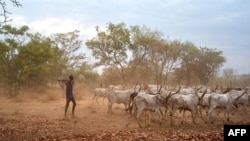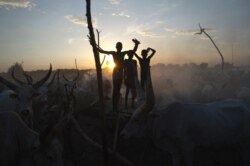With an eye toward ending intercommunal violence that killed dozens of people last month in Central Equatoria state, South Sudanese religious leaders and civil society activists have organized direct peace and reconciliation talks between various communities.
Some meetings already have taken place in rural villages of Terekeka County and included chiefs, women, youth, farmers, and cattle camp leaders.
Paul Ygugusuk, archbishop of the Central Equatoria province of the Episcopal Church of South Sudan, blames a lack of clear laws on the movement of cattle and justice for victims of cattle raids for the increased violence in certain areas, particularly in Terekeka and Lainya counties.
“The problem of Terekeka is that all previous resolutions have not been implemented, stolen cattle have not been returned; as such people take the law into their own hands,” Yugusuk told VOA’s South Sudan in Focus.
Cattle raids are a chronic problem in parts of South Sudan, separate from the civil war that killed tens of thousands between 2013 and 2017.
More than 50 people were killed and hundreds of others were displaced by sectional violence in December alone, according to Paul Modi, bishop of the Episcopal Church’s Terekeka diocese.
“Many people have been affected, displaced and living in hiding and properties lost. In many consultative forums, most of them are ready to reconcile and we call on the people to give room for peace and dialogue so that we can move forward,” Modi told South Sudan in Focus.
Edmund Yakani, executive director for the local NGO Community Empowerment for Progress Organization, said the government should renew a failed gun-collection campaign aimed at reducing violence in the area, while making a greater effort to protect people’s lives and property.
“The disarmament did not work effectively and responsively, because there are [not] critical factors like provision of safety and protection for the lives of the communities through police that can adhere to the rule of law. And the state needs to engage in intercommunal mitigation free from political manipulation,” Yakani said.
Yakani says his group and other NGOs are organizing a national peace dialogue to be held later this month that will address the cyclical violence caused by cattle raids and revenge attacks.
Archbishop Yugusuk is urging armed and non-armed actors to reconcile their political differences and work for lasting peace in South Sudan.
“We cannot do our work when people are fighting. Now that there is an ongoing peace dialogue in Rome and although it’s going slowly, we call on the conflicting communities, the opposition and the government that the time has come for us to join hands for the revitalized peace agreement so that the implementation becomes easy,” he said.
In his 2021 New Year’s message, President Salva Kiir called on the people of South Sudan to reconcile and work for peace. He said the transitional government is committed to peacefully resolving conflicts across the country.









